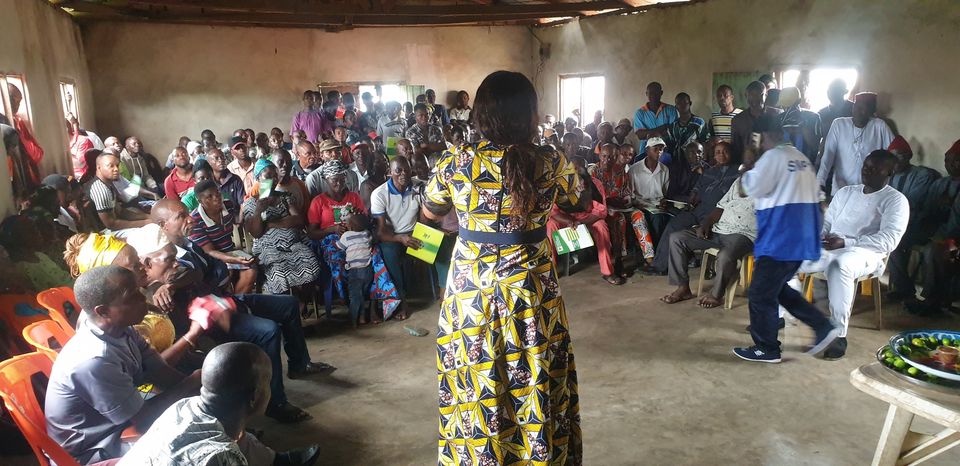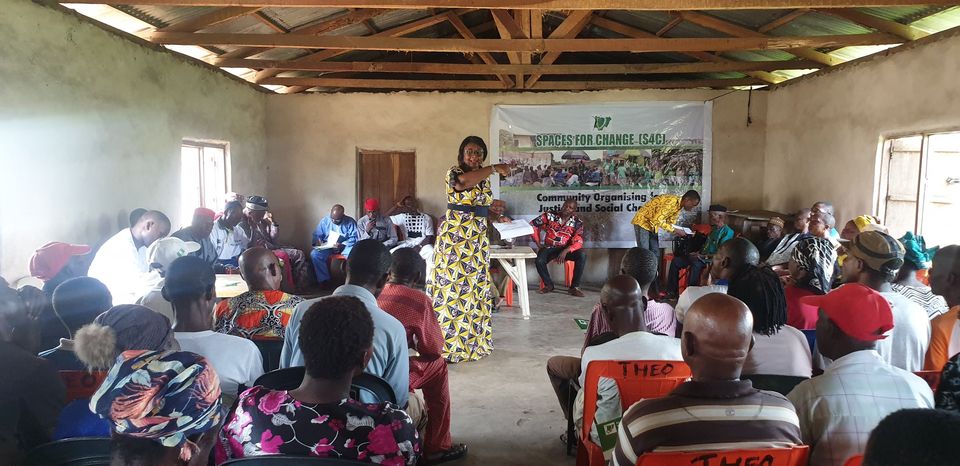
193 natives of the Ohoba community in Ohaji/Egbema Local Government Area of Imo State, including the Traditional Prime Minister of the community, members of the Eze’s cabinet, women and youth leaders, converged at SPACES FOR CHANGE’s townhall, tagged, Equitable Sharing of Benefits of Natural Resources in the Petroleum Host Communities held on October 3, 2020. The townhall, organized with the support of Ford Foundation, offered an opportunity for a fruitful debate among local stakeholders aimed toward maximizing the benefits of natural resources for host communities and minimizing potential harms.
With an estimated gas deposits in excess of 7.8 trillion cubic feet, Imo communities are attracting several multinational oil and gas companies interested in extracting their enormous natural resource deposits. Ohoba is one of the 11 communities with huge gas deposits hosting the Assa North Gas development (ANOH) project in Ohaji-Egbema local government area of Imo State. In 2019, the project promoters, mainly Shell Petroleum Development Company (SPDC), Ohaji Egbema constituted a Cluster Development Board with members drawn from the host communities comprising Avu, Umuapu, Obitti, Ohoba and Obosima, who will manage a ‘N1 billion’ community trust over the next five years and implement a Global Memorandum of Understanding (GMOU) established for the project. As experience from resource-rich locales have shown, high-scale extractive investments of this nature can fail to translate into long term sustainable development if not managed properly. It was on this premise that the townhall was convened to facilitate a discussion around how legal empowerment and equitable benefit-sharing principles can be integrated into the ANOH projects so that they can contribute to socially inclusive and environmentally sustainable development in the host communities.
Discussions at the townhall centered on the understanding the nature of licenses and leases held by operators, the land acquisition and compensation arrangements, the environmental impact assessments conducted, the community engagement practices of extractive companies operating in the community and the state of local infrastructure within the community. Although the natives knew the names of the multinational companies operating in their communities, they had limited knowledge of the nature and scope of extractive activities going on. Not only that, they were unaware whether operators held oil prospecting licenses or mining leases. For instance, one of the youth leaders who spoke on behalf of the community expressed deep concerns about the community engagement methods adopted by Watersmith Petroman Company. They alleged that Watersmith found some oil wells in Ohoba community but up till this moment, has not deemed it fit to officially notify the traditional ruler of the community about their recent oil finds and seek the necessary community support. This has left the community in the dark about Watersmith’s operations in the community.
Online sources, however, indicate that Waltersmith Petroman Oil Ltd. subsidiary Waltersmith Refining & Petrochemical Ltd. has started pre-commissioning activities for the first 5,000-b/d phase of its previously announced 30,000-b/d modular refinery at Ibigwe oil field, in the Ohaji Egbema Local Government Area, Imo state, Nigeria (OGJ Online, June 19, 2018). Concerning the new oil discovery by Watersmith in the community, some villages in Ohoba went to court to claim the ownership of lands where the oil heads/well were found for the purpose of determining the appropriate compensation. As a result, the oil company suspended the payment of compensation and enjoined natives to wait for the outcome of the court action.
Locals further decried the poor living conditions in the host communities. Contrary to the promise of increased job opportunities, better infrastructure, economic empowerment and a better life, the standard of living has not improved. Primary, secondary and hospital buildings remain dilapidated. Locals lack access to electricity, good roads, potable water, healthcare and require government presence, including critical support from the oil companies operating in their environs. The conversation around broken and delayed promises climaxed with updates from community leaders suggesting that community expectations of benefits may not be actualized. For instance, one of the oil companies operating in the area, Seplat Petroleum Development Company, had promised to dualize the road connecting Ohoba to Assa. When the community contacted them recently, SEPLAT cited COVID-19 as an excuse for not commencing the construction of the road.
Another point of concern for communities relates to the skillset of workers required to work in the oil and gas companies. Promises of job creation has not been met because the indigenes neither have the education nor the skills that meet the job specifications. The locals are concerned that they can only supply unskilled and semi-skilled workers, but provisions are rarely made to absorb such category of workers. Consequently, unemployment is rife within the area while youth restiveness is on the increase.
In response to these concerns, the presentations delivered by SPACES FOR CHANGE focused on increasing community understanding of the trends and best practices in negotiating GMOUs with indigenous and multinational oil companies, the environmental impacts associated with petroleum operations, the applicable state and federal legislations relevant to the local context and the provision of technical assistance to support host communities to negotiate, monitor, and implement equitable benefit-sharing arrangements associated with large-scale natural resource and infrastructure investments. Community also heeded S4C’s counsel to be vigilant and resist divide-and-rule tactics often used to overrun community interests. Such tactics create tensions among locals, make it impossible for them to speak with one voice and therefore, making it easier to sabotage the collective will of the people. S4C stands ready to work together with the community to create an enabling environment for community development.




